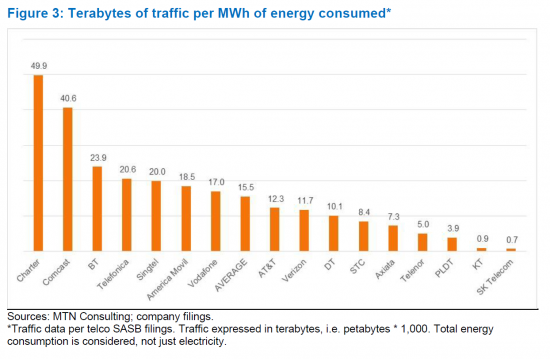|
市场调查报告书
商品编码
1309748
通信网络能源效率将每年提高12%:每兆瓦时能源消耗的流量将从2020年的12.3TB增长到2022年的15.5TB,但进一步提高效率对于降低成本和排放至关重要Telco Network Energy Efficiency Rising 12% Per Year: Average Telco Carried 15.5 Terabytes of Traffic Per MWh of Energy Consumed in 2022, From 12.3 in 2020, More Efficiency is Essential to Control Costs, Emissions |
|||||||
本研究涵盖的 16 家运营商按收入计算占全球市场的 40% 以上。这16家公司每百万美元收入的平均流量从2020年的1.41PB增长到2022年的1.93PB,增长了37%。2020年至2022年,16家公司的网络流量复合年增长率为13.8%,而总能源消耗的复合年增长率仅为1.2%。每PB能源消耗从2020年的81.3兆瓦时下降到2022年的64.4兆瓦时。这一改进符合运营商及其供应商长期提高网络能源效率的目标。同期,16家公司单位运输量平均碳排放量也有所下降,从2020年的1.108亿MTCO2e/PB减少到2022年的83.3MTCO2e/PB。
本报告通过对16家运营商的网络流量、能源消耗、碳排放和收入等数据进行分析,探讨运营商市场能源消耗与网络流量之间的关係。
视觉的

覆盖范围
上市公司/机构
|
|
目录
概括
通信网络能效:每年提高12%
- 数据集概述
- 收入和流量挑战依然存在
- 碳排放对于电信公司变得更加重要
- 每消耗能源单位的传输流量
- 供应商:在持续改进中发挥核心作用
- 一般性评论
附录
For a group of 16 telcos, MTN Consulting has analyzed data on network traffic, energy consumption, carbon emissions, and revenues. This brief examines the relationship between energy consumption and network traffic in the telco market.
VISUALS

The group of 16 telcos included in this analysis represent over 40% of the global market, based on revenues. On a revenue basis, our data verify the well-known revenue-traffic conundrum: in 2022, the average telco carried 1.93 Petabytes of traffic per US$1M in revenue, up 37% from 1.41 PB/$M in 2020. In the 2020-22 timeframe, this group increased network traffic at an average annual rate (CAGR) of 13.8%, while their total energy consumption grew at a CAGR of 1.2%. As such, in 2022 the average telco consumed 64.4 MWh of energy per Petabyte of traffic, down from 81.3 MWh/PB in 2020. This improvement is in line with the stated goal of both telcos and their vendors: to improve the network's energy efficiency over time. The average telco's carbon footprint per unit of traffic also declined in the same period, from 110.8 millions of tons of CO2 equivalent (MTCO2e) per Petabyte in 2020 to 83.3 MTCO2e/PB in 2022.
Telco sustainability reports emphasize the importance of adopting energy efficient technologies and network designs. Vendors consider the energy efficiency of their solutions a crucial differentiator. As telcos attempt to lower energy costs and reduce their carbon footprints, vendors have an opportunity to support further improvements.
COVERAGE:
Organizations mentioned:
|
|
Table of Contents
Summary
Telco network energy efficiency rising 12% per year
- Overview of the dataset
- The revenue-traffic conundrum persists
- Carbon emissions rising in importance for telcos
- Traffic carried per unit of energy consumed
- Vendors have a central role in sustaining improvements
- Conclusion
Appendix
List of Tables and Figures
- Table 1: Summary metrics for the "Group of 16" telcos
- Figure 1: Petabytes of traffic on network per US$M in revenue, 2020-22*
- Figure 2: Carbon footprint (MT CO2e) per petabyte of traffic on network, 2020-22*
- Figure 3: Terabytes of traffic per MWh of energy consumed*













